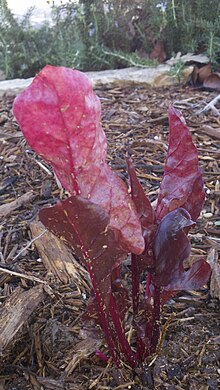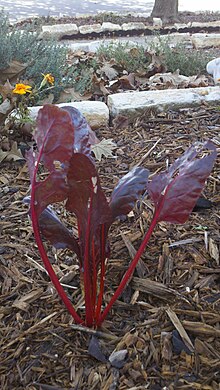Talk:Chard
| This It is of interest to the following WikiProjects: | ||||||||||||||||||||||||||||||||||||||
| ||||||||||||||||||||||||||||||||||||||
why nutrition data for cooked one ?[edit]
Raw one will be easier to compare.
Bland recipe removed[edit]
I erased the given recipe for "cooking suggestions." It was bland and absolutely disgusting.
- This vegetable is indeed rather bland, and certainly has less flavour than true spinach. --80.176.142.11 (talk) 17:29, 6 July 2008 (UTC)
Turnips link[edit]
Clicked on link for additional informaton on 'Turnips' pulled up 'Chards' instead. thanks!
Subspecies info is confusing[edit]
Article is confusing. Is the subspecies maritima or var. cicla? And for the non-scientists, is it permissible to spell out "var." and "subsp."? Nurg (talk) 23:48, 28 June 2008 (UTC)
Cultivation[edit]
The article claims that Chard will not grow in ordinary garden soil, favoring slightly alkali soils. It is in fact extremely easy to grow and is a good vegetable for child gardeners (courgette / zucchini is another very easy one). The seeds germinate easily in pots and I have never had a plant die after planting out, despite having a damp shady garden infested with slugs. They continue to crop heavily for many months. --80.176.142.11 (talk) 17:42, 6 July 2008 (UTC)
Ditto - I've worked on farms, and can attest chard's an easy crop. I'm going to remove the statement for now. If someone has a reference to cite for chard favoring alkali, great - soil preferences are a great detail to have. But I have my doubts about it not growing in "ordinary garden soil", whatever "ordinary" might mean. After all, soil varies quite a bit... Candle-ends (talk) —Preceding comment was added at 22:55, 6 July 2008 (UTC)
"Swiss"[edit]
Does it have any connection to Switzerland or the Swiss people? If so, what is the connection? This would seem to be basic information that should already be covered in the article, but isn't. Badagnani (talk) 05:20, 10 November 2008 (UTC)
The variety of Chard known as Swiss Chard does not have a clear history though it is thought to be named for 19th century Swiss botanist Koch but the vegetable was referred to as Swiss Beet in the 18th century. The etymology section is incorrect. — Preceding unsigned comment added by Tzigrrl (talk • contribs) 22:09, 17 May 2014 (UTC)
WikiProject Italy tag[edit]
Why is the article so tagged? I fail to see why chard is particularly associated with Italy, being primarily a temperate zone crop. 'Italy' isn't mentioned once in the text. --Ef80 (talk) 13:37, 3 March 2010 (UTC)
Often labelled as 'spinach' in Australia[edit]
It may be worth noting that silverbeet is often referred to and labelled as 'spinach' in Australia. I'm just not sure where is the best place in the article, or what is the best way, to add this information.--TyrS (talk) 04:39, 8 July 2010 (UTC)
- It's a regional thing, for example in Queensland it is invariably sold as silverbeet. On moving to New South Wales I note it's always called spinach, the true spinach variety being "English Spinach". When I refer to silverbeet in NSW I get puzzled looks. --MichaelGG (talk) 22:20, 30 October 2014 (UTC)
- Yes, I've seen it as a regional Melbourne/Sydney difference too. I haven't been able to find a citation to match the one for South Africa; the NSW Dept. of Primary Industries don't seem to be aware of what people are calling it. Sminthopsis84 (talk) 15:26, 31 October 2014 (UTC)
Oxalic acid?[edit]
Does chard have oxalic acid? It doesn't have any of the taste I associate with that chemical. Maybe someone was thinking of spinach? Monado (talk) 05:20, 25 January 2011 (UTC)
- I just read the same thing on German Wikipedia, where they explicitely recommend people with kidney conditions not to consume it (because of the danger of developing oxalate stones...) -- megA (talk) 15:20, 19 February 2011 (UTC)
If a vegetable is high in calcium, it will most likely be high in oxalic acid. Oxalic acid is used by plants to neutralize the toxicity that calcium has on plants. Sorry vegans/vegetarians... that's just how the calcium ball bounces in the plant world. — al-Shimoni (talk) 15:20, 29 September 2013 (UTC)
According to data cited by John Emsley in "Molecules at an exhibition" gallery (i.e. chapter) 1, "portrait" 2 (Oxford Univerisity Press 1998 ISBN 978-0-19-286206-8) Swiss Chard contains 700 mg oxalic acid per 100 gram to compare with 600 for spinach and 500 for rhubarb. I agree that this sounds strange but the oxalic acid of spinach does not have very pronounced effects on its taste either. Perhaps the figures represent oxalic acid and oxalates together counted as oxalate with less free acid in spinach and chard than in rhubarb?94.234.55.39 (talk) 23:34, 6 January 2021 (UTC)
- Still not good for my chickens tho'! 78.151.66.177 (talk) 13:53, 23 July 2023 (UTC)
Beta vulgaris[edit]
The articles Beet, Beetroot and Chard should be merged into a single article under the title "Beta vulgaris". —Preceding unsigned comment added by 109.125.14.161 (talk) 21:00, 13 February 2011 (UTC)
Color[edit]
No matter what the New York Times says, chard leaves are not always dark green. I am currently growing some where the leaves are dark red. They are young plants (30cm) so I am not certain what will happen with the color as they mature. Here are pics from my garden:

In addition I have found a photo online from a Planet natural seed catalog showing various shades of leaf color including light green, dark green and yellow green.
— Preceding unsigned comment added by Nearearthevent
Etymology[edit]
The statement "The word "Swiss" was used to distinguish chard from French spinach varieties by 19th century seed catalogue publishers." is not the correct history of the Swiss name. Please cite the reference. Tzigrrl (talk) 22:22, 17 May 2014 (UTC)
I removed a statement that the vegetable is a coastal plant native to Sicily. The wild species is indeed coastal but is found round much of Europe. The cultivar is not specifically coastal, and if it originated in Sicily that needs a citation.Newburyjohn (talk) 11:18, 27 August 2023 (UTC)
Taxonomy[edit]
According to Beta vulgaris, Chard's taxonomy is B. v. ssp. v. convar. cicla. var. flavescens. It specifically states that "All cultivated varieties fall into the subspecies Beta vulgaris subsp. vulgaris." Have I misunderstood something, or is is this article's taxonomy incorrect? Thanks. TheMightyQuill (talk) 11:43, 26 February 2015 (UTC)
- Chard was sometimes classified as own subspecies, but today the accepted name is Beta vulgaris subsp. vulgaris for all cultivars. See Uotila, P. (2011): Chenopodiaceae (pro parte majore). – In: Euro+Med Plantbase or Tropicos, which is cited in the taxobox. Treating the cultivars at the rank of varieties/convarieties is still partly in use, but gradually changes to the use of rankless cultivar groups. The actual name is Beta vulgaris subsp. vulgaris, Cicla Group for the spinach beet and Flavescens Group for chard, see MMPND. --Thiotrix (talk) 16:35, 26 February 2015 (UTC)
Thanks Thiotrix. You sound like you know what you are talking about. Would you like to change the article accordingly? - TheMightyQuill (talk) 18:03, 26 February 2015 (UTC)
External links modified[edit]
Hello fellow Wikipedians,
I have just modified one external link on Chard. Please take a moment to review my edit. If you have any questions, or need the bot to ignore the links, or the page altogether, please visit this simple FaQ for additional information. I made the following changes:
- Added archive http://www.webcitation.org/6Fu9TOBWl?url=http%3A%2F%2Fwww.plantnames.unimelb.edu.au%2FSorting%2FBeta.html to http://www.plantnames.unimelb.edu.au/Sorting/Beta.html
When you have finished reviewing my changes, please set the checked parameter below to true or failed to let others know (documentation at {{Sourcecheck}}).
![]() An editor has reviewed this edit and fixed any errors that were found.
An editor has reviewed this edit and fixed any errors that were found.
- If you have discovered URLs which were erroneously considered dead by the bot, you can report them with this tool.
- If you found an error with any archives or the URLs themselves, you can fix them with this tool.
Cheers.—InternetArchiveBot (Report bug) 18:02, 19 November 2016 (UTC)
- Start-Class vital articles
- Wikipedia level-4 vital articles
- Wikipedia vital articles in Biology and health sciences
- Start-Class level-4 vital articles
- Wikipedia level-4 vital articles in Biology and health sciences
- Start-Class vital articles in Biology and health sciences
- Start-Class plant articles
- High-importance plant articles
- WikiProject Plants articles
- Start-Class Food and drink articles
- High-importance Food and drink articles
- WikiProject Food and drink articles
- Start-Class Italy articles
- Mid-importance Italy articles
- All WikiProject Italy pages




